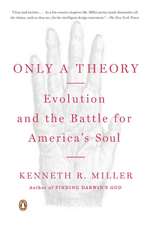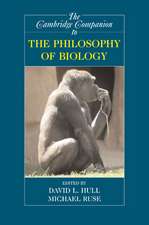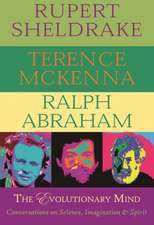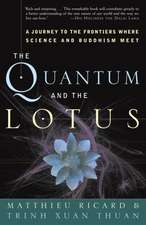Philosophy of Experimental Biology: Cambridge Studies in Philosophy and Biology
Autor Marcel Weberen Limba Engleză Paperback – 9 iun 2010
| Toate formatele și edițiile | Preț | Express |
|---|---|---|
| Paperback (1) | 321.14 lei 6-8 săpt. | |
| Cambridge University Press – 9 iun 2010 | 321.14 lei 6-8 săpt. | |
| Hardback (1) | 541.80 lei 6-8 săpt. | |
| Cambridge University Press – 29 aug 2004 | 541.80 lei 6-8 săpt. |
Din seria Cambridge Studies in Philosophy and Biology
- 11%
 Preț: 479.78 lei
Preț: 479.78 lei - 11%
 Preț: 617.45 lei
Preț: 617.45 lei -
 Preț: 278.41 lei
Preț: 278.41 lei -
 Preț: 292.69 lei
Preț: 292.69 lei - 14%
 Preț: 903.74 lei
Preț: 903.74 lei -
 Preț: 315.54 lei
Preț: 315.54 lei -
 Preț: 417.46 lei
Preț: 417.46 lei - 14%
 Preț: 757.37 lei
Preț: 757.37 lei -
 Preț: 299.82 lei
Preț: 299.82 lei -
 Preț: 208.50 lei
Preț: 208.50 lei -
 Preț: 417.84 lei
Preț: 417.84 lei -
 Preț: 390.04 lei
Preț: 390.04 lei - 11%
 Preț: 704.66 lei
Preț: 704.66 lei -
 Preț: 279.48 lei
Preț: 279.48 lei - 11%
 Preț: 417.38 lei
Preț: 417.38 lei -
 Preț: 289.01 lei
Preț: 289.01 lei -
 Preț: 232.63 lei
Preț: 232.63 lei -
 Preț: 375.68 lei
Preț: 375.68 lei -
 Preț: 321.65 lei
Preț: 321.65 lei -
 Preț: 252.30 lei
Preț: 252.30 lei - 11%
 Preț: 423.22 lei
Preț: 423.22 lei -
 Preț: 272.36 lei
Preț: 272.36 lei -
 Preț: 284.39 lei
Preț: 284.39 lei -
 Preț: 323.95 lei
Preț: 323.95 lei - 11%
 Preț: 682.91 lei
Preț: 682.91 lei - 11%
 Preț: 541.80 lei
Preț: 541.80 lei - 11%
 Preț: 693.51 lei
Preț: 693.51 lei - 11%
 Preț: 693.89 lei
Preț: 693.89 lei - 11%
 Preț: 453.71 lei
Preț: 453.71 lei - 11%
 Preț: 437.40 lei
Preț: 437.40 lei - 14%
 Preț: 685.74 lei
Preț: 685.74 lei -
 Preț: 323.65 lei
Preț: 323.65 lei -
 Preț: 355.74 lei
Preț: 355.74 lei -
 Preț: 393.91 lei
Preț: 393.91 lei
Preț: 321.14 lei
Nou
Puncte Express: 482
Preț estimativ în valută:
61.46€ • 63.80$ • 51.25£
61.46€ • 63.80$ • 51.25£
Carte tipărită la comandă
Livrare economică 22 martie-05 aprilie
Preluare comenzi: 021 569.72.76
Specificații
ISBN-13: 9780521143448
ISBN-10: 0521143446
Pagini: 376
Dimensiuni: 152 x 229 x 23 mm
Greutate: 0.5 kg
Editura: Cambridge University Press
Colecția Cambridge University Press
Seria Cambridge Studies in Philosophy and Biology
Locul publicării:New York, United States
ISBN-10: 0521143446
Pagini: 376
Dimensiuni: 152 x 229 x 23 mm
Greutate: 0.5 kg
Editura: Cambridge University Press
Colecția Cambridge University Press
Seria Cambridge Studies in Philosophy and Biology
Locul publicării:New York, United States
Cuprins
Preface; Acknowledgements; 1. Introduction; 2. Reductionism and the nature of explanations; 3. Discovery: solving biological problems; 4. Scientific inference: testing hypotheses; 5. Experimental systems: a life of their own?; 6. Model organisms: of flies and elephants; 7. Reference and conceptual change: out of Mendel's garden?; 8. Developmental biology and the genetic program: explaining ontogeny; 9. Scientific realism: in search of the truth; Notes; Bibliography; Index.
Recenzii
Review of the hardback: 'I feel that Weber's treatment will move the philosophical discussion well beyond Schaffner's original study … strength of Weber lies in combining two ideals. First, his philosophical discussion is based on detailed case studies from biochemistry, molecular biology, developmental genetics, and neurophysiology. Second, despite close attention to actual science, Weber always keeps questions from the general philosophy of science clearly in view … This is a very rich book, dealing with various issues - questions peculiar to experimental biology as well as basic topics from the general philosophy of science … many of Weber's ideas will serve as a point of reference for future philosophical discussions on molecular biology. Philosophy of Experimental Biology ought to be important for anyone interested in the philosophy of biology.' Biology and Philosophy
Review of the hardback: 'Marcel Weber's book is extremely interesting. It overviews a huge spectrum of viewpoints and case studies and surely represents a precious account of the state of art of the philosophy of experimental biology. An aspect that … enriches [the reading] … is Weber's attempt to always furnish his personal, often distinctive viewpoint.' History and Philosophy of the Life Sciences
Review of the hardback: 'Marcel Weber's book is extremely interesting. It overviews a huge spectrum of viewpoints and case studies and surely represents a precious account of the state of art of the philosophy of experimental biology. An aspect that … enriches [the reading] … is Weber's attempt to always furnish his personal, often distinctive viewpoint.' History and Philosophy of the Life Sciences
Descriere
This book explores some central philosophical issues concerning scientific research in experimental biology.


















